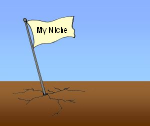 Nobody likes a sore loser, but they’re out there, waiting to complain about your blog contests. Don’t set yourself up for trouble. Instead, be sure to protect yourself by writing explicit rules for your blog contests. Believe it or not, even if you’re just giving away a stick of gum in your blog contest, it’s possible that people could complain about the results if they don’t win.
Nobody likes a sore loser, but they’re out there, waiting to complain about your blog contests. Don’t set yourself up for trouble. Instead, be sure to protect yourself by writing explicit rules for your blog contests. Believe it or not, even if you’re just giving away a stick of gum in your blog contest, it’s possible that people could complain about the results if they don’t win.
Additionally, you should publish rules with your blog contest post to protect yourself. For example, are you willing to pay shipping costs to mail your blog contest prize to the other side of the world? This is just one thing you need to think about before you publish your blog contest post to make sure the entire process goes smoothly and you leave no loopholes to participation.
Following are several suggestions for writing your blog contest rules to protect yourself from potential complaints or legal trouble:
1. Clearly state the entry time frame.
Make sure your contest has a start and end date and time and include the time zone!
2. Clearly state prize delivery restrictions.
This is where you can communicate where you’re willing to ship prizes and what delivery method you’ll use. For example, if you live in the United States, you might want to set a restriction saying that only people living in the United States can enter to avoid large overseas postage fees.
3. Clearly state what qualifies as an entry.
You need to make sure people understand exactly what they need to do in order to have a qualified entry into the contest. Don’t just assume people will “get it”. Instead, spell it out for them in no uncertain terms.
4. Clearly state how winners will be chosen.
If your blog contest winner will be chosen randomly, include that information in your blog contest post. You might want to use a tool like Randomizer.org to select the winner, and mention this in your post. If the winner will be chosen using a subjective selection process, clearly state the steps necessary to submit a qualified entry and explain how winners will be chosen from those entries.
5. Clearly state how the winner will be contacted, the prize acceptance rules, and the alternate winner selection process.
Believe it or not, your blog contest winner might not respond to your attempts to contact them to obtain their mailing address or other necessary information to send their prize to them. Therefore, it’s important that you tell people in your blog contest post how the winner will be notified, so people are sure to include accurate contact information with their entries. Also, explain how long winners have to respond to your attempt to contact them before an alternate winner will be selected, so you’re not holding a prize indefinitely for a winner that never responds to you. Finally, describe how the alternate winner will be selected.
Blog contests are a great way to reward your loyal readers and drive a short-term traffic boost to your blog. However, they can cause problems, and by following the suggestions above, you can protect yourself from some of those dangers.
What rules and information do you include in your own blog contest posts? Leave a comment and share what works for you.
Image: stock.xchng

 I’m in love with a WordPress plugin. Let me stop right now and tell you that I’m not a WordPress plugin floozy. I don’t dive in and try every WordPress plugin I hear about, and I definitely don’t jump on the bandwagon and pay for WordPress plugins. Nope. I’m usually late to the WordPress plugin party and try plugins after other people test them out and share their thoughts about them.
I’m in love with a WordPress plugin. Let me stop right now and tell you that I’m not a WordPress plugin floozy. I don’t dive in and try every WordPress plugin I hear about, and I definitely don’t jump on the bandwagon and pay for WordPress plugins. Nope. I’m usually late to the WordPress plugin party and try plugins after other people test them out and share their thoughts about them. I often refer to the term I use to describe amazing content that people want to share online as shareworthy, and today, I’d like to dive a bit deeper into the concept of creating shareworthy content, so your blog and online reputation can benefit from the
I often refer to the term I use to describe amazing content that people want to share online as shareworthy, and today, I’d like to dive a bit deeper into the concept of creating shareworthy content, so your blog and online reputation can benefit from the  It seems like everyone is trying to find their niche on the social web, particularly when it comes to blogging. In simplest terms, a niche is a very specific area of focus, and a niche blog is one that is tightly focused on one specific subject.
It seems like everyone is trying to find their niche on the social web, particularly when it comes to blogging. In simplest terms, a niche is a very specific area of focus, and a niche blog is one that is tightly focused on one specific subject. The compounding effect of blogging is a topic I often discuss in my books, to my clients, and at speaking engagements, but in order to understand the compounding effect of blogging, you have to understand the importance of search engines in sending visitors to your blog.
The compounding effect of blogging is a topic I often discuss in my books, to my clients, and at speaking engagements, but in order to understand the compounding effect of blogging, you have to understand the importance of search engines in sending visitors to your blog. I bet you didn’t know that a lot of the things you need to know to be a good blogger were taught to you before you could even write your name. It’s true! A lot of the things you learned in Kindergarten apply to blogging and other aspects of your social web activities.
I bet you didn’t know that a lot of the things you need to know to be a good blogger were taught to you before you could even write your name. It’s true! A lot of the things you learned in Kindergarten apply to blogging and other aspects of your social web activities.
 Guest posting is a great way to increase traffic, network with other bloggers, and build links. But how do you know which blogs are good guest post opportunities?
Guest posting is a great way to increase traffic, network with other bloggers, and build links. But how do you know which blogs are good guest post opportunities?